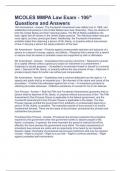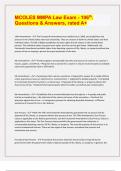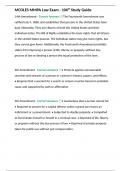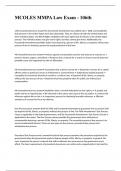Mcoles mmpa law exam - Study guides, Class notes & Summaries
Looking for the best study guides, study notes and summaries about Mcoles mmpa law exam? On this page you'll find 5 study documents about Mcoles mmpa law exam.
All 5 results
Sort by
MCOLES MMPA Law Exam - 106th Study Guide

-
MCOLES MMPA Law Exam - 106th Questions and Answers
- Exam (elaborations) • 12 pages • 2023
- Available in package deal
-
- $12.49
- + learn more
MCOLES MMPA Law Exam - 106th Questions and Answers
MCOLES MMPA Law Exam 2023 with correct answers

-
MCOLES MMPA Law Exam - 106th. Questions & Answers, rated A+
- Exam (elaborations) • 16 pages • 2023
- Available in package deal
-
- $12.99
- + learn more
MCOLES MMPA Law Exam - 106th. Questions & Answers, rated A+ 14th Amendment - -The Fourteenth Amendment was ratified July 9, 1868, and establishes that persons in the United States have dual citizenship. They are citizens of both the United States and their individual states. The Bill of Rights establishes the basic rights that all citizens in the United States possess. The individual states may give more rights, but they cannot give fewer. Additionally, the Fourteenth Amendment prohibits st...

-
MCOLES MMPA Law Exam - 106th, Top Exam Questions and answers, graded A+
- Exam (elaborations) • 16 pages • 2023
- Available in package deal
-
- $10.49
- + learn more
MCOLES MMPA Law Exam - 106th, Top Exam Questions and answers, graded A+ 14th Amendment - -The Fourteenth Amendment was ratified July 9, 1868, and establishes that persons in the United States have dual citizenship. They are citizens of both the United States and their individual states. The Bill of Rights establishes the basic rights that all citizens in the United States possess. The individual states may give more rights, but they cannot give fewer. Additionally, the Fourteenth Amendment ...

Did you know that on average a seller on Stuvia earns $82 per month selling study resources? Hmm, hint, hint. Discover all about earning on Stuvia




